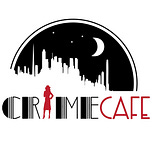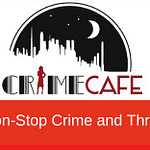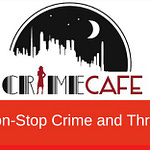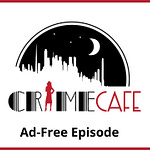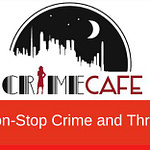Subscribe:
Apple Podcasts | Google Podcasts | Spotify | Stitcher | Blubrry | Email | TuneIn | RSS | More
Debbi Mack interviews crime writer Samantha Downing.
This is the Crime Cafe, your podcasting source of great crime, suspense and thriller writing. I’m your host Debbi Mack. Before I bring on my guest, I’ll just remind you that the Crime Cafe has two eBooks for sale: the nine book box set and the short story anthology. You can find the buy inks for both on my website, debbimack.com under the Crime Cafe link. You can also get a free copy of either book if you become a Patreon supporter. You’ll get that and much more if you support the podcast on Patreon, along with our eternal gratitude for doing so.
Check us out on Patreon: https://www.patreon.com/crimecafe
Please join my fundraising team, DMV Dystonia, to raise funds for research on this rare movement disorder. Remember to pick that team when signing up!
The full link is here: https://bit.ly/DMVDystonia
Debbi (00:54): But first, let me put in a good word for Blubrry podcasting.
I’m a Blubrry affiliate, but that’s not the only reason I’m telling you this. I’ve been using Blubrry Podcasting as my hosting service for my podcast for years and it’s one of the best decisions I ever made. They give great customer service, you’re in complete control of your own podcast, you can run it from your own website, and it just takes a lot of the work out of podcasting for me. I find for that reason that it’s a company that I can get behind 100% and say, “You should try this.” Try Blubrry. It doesn’t require a long-term contract, and it’s just a great company, period. It also has free technical support by email, video, and phone, so you can get a human being there. Isn’t that nice?
If you want to podcast, try out Blubrry. No long-term contract, excellent distribution, and great technical support, too, by email, video, and on the phone. I’ve included an affiliate link on this blog.
Here’s a link to a PDF copy of the interview.
Debbi: Hi, everyone. Our guest today recently released her third novel. It’s called FOR YOUR OWN GOOD, and has been optioned by a production company to be adapted into, I suppose, an HBO Max series. We’ll have to talk about that to the extent it can be talked about. Her first novel, MY LOVELY WIFE, has been nominated for multiple awards, and is also under option to be adapted for the screen. She lives and works in New Orleans, a place that I’ve always wanted to visit, but have not gotten around to yet. I am pleased to have with me Samantha Downing. Hi Sam, how are you doing today?
Samantha: I’m good. Thank you for having me.
Debbi: Well, thank you for being here. I really, really appreciate it. The setting of your latest book reminds me of an interview I just did with another author who was an educator. And her comment to me was that she was surprised that more authors didn’t set their books in schools because they’re like microcosms of society. And my thought was it’s like a small town. What are your thoughts on that?
Samantha: Absolutely. I think there’s a… In this book, in FOR YOUR OWN GOOD, there’s a number of social structures that exist within the school. There is the structure between the teachers themselves. This is a private school where the kids are all wealthy. The parents pay the bills. And some of the teachers are wealthy, some of them are not. And there is a structure between the parents and the teachers. The parents pay the bills and are the donors to the school, so they think they can tell the teachers what to do. And then there are the students who drive better cars than the teachers. So, the money and the wealth and the entitlement has a lot to do with the story itself. The protagonist, or one of the main characters, is Teddy Crutcher, who is not wealthy and lives on a teacher’s salary, and that is something that really drives him and his actions in the book.
In this book, in FOR YOUR OWN GOOD, there’s a number of social structures that exist within the school.
Debbi: I was going to say, you start off with a very interesting scene where Crutcher seems like maybe a guy you can empathize with, and then things get very, very dark quickly.
Samantha: Yes. I’ve actually had teachers say that they completely understand where Teddy is coming from. They just don’t necessarily agree with his actions. So, he definitely is someone… He’s an underdog, and he sees himself as an underdog, and it is important to his psyche and his belief system. He has his own criteria for grading students, and it has nothing to do with merit whatsoever. He very much realizes the power he has as a teacher to affect these students’ lives, and he uses it, which is a very scary thought that a teacher would do that.
I’ve actually had teachers say that they completely understand where Teddy is coming from. They just don’t necessarily agree with his actions. So, he definitely is someone… He’s an underdog,
Debbi: Yes. Yes, very scary. And I can’t help but see parallels to things that go on today, not just in schools, but in society.
Samantha: Yes. I think when people realize the power that they have and they use it, then you have to look at the type of person that’s doing it. In this case, Teddy is essentially a psychopath. And the thing about psychopaths is you don’t know they are until they’re arrested or they do something horrible. And not all psychopaths are violent. So, they’re out there. They’re affecting things. And if you have one that’s a teacher, they are affecting students in ways we can only imagine. It was one of the things I wanted to explore in this book is what happens when you have someone who’s a psychopath as a teacher.
In this case, Teddy is essentially a psychopath. And the thing about psychopaths is you don’t know they are until they’re arrested or they do something horrible. And not all psychopaths are violent. So, they’re out there. They’re affecting things.
Debbi: Yeah. I mean, people in positions of authority over young people, well, they have so much power, and young people are relatively powerless.
Samantha: Yes. And in a lot of the books that are set in schools, there’s a whole genre called dark academia. A lot of what gets talked about is teachers who are sexual predators. And of course, that’s what people are always on the lookout for. Because if you are a sexual predator of young people, becoming a teacher is a great job option for you because it puts you right where you want to be. I did not want to do anything like that. I really wanted to explore a different aspect, a different kind of bad teacher, and Teddy was definitely that.
Debbi: Was there something in particular that inspired you to write this book?
Samantha: Not something in particular. Most of my books, what I try to do is put it in a setting that is familiar to people. Because I know the book is going to get crazy and go out there with things that you probably have not seen before and hopefully have not experienced. So, the setting sort of grounds people. And a high school, we’ve all been through high school and possibly have kids in high school. So, high school is a shared experience for everyone regardless of whether it was a private school or not. So, that was really my intention. I wanted to write, and I wanted to write specifically about a teacher. Because we do try to honor our teachers and try to thank them for what they do, but there’s always a bad apple. Right? So, that’s the one I wanted to write about.
Most of my books, what I try to do is put it in a setting that is familiar to people. Because I know the book is going to get crazy and go out there with things that you probably have not seen before and hopefully have not experienced. So, the setting sort of grounds people.
Debbi: That’s it. That’s true. I noticed in an interview that you did that you described the high school experience in two words, pressure and confusion.
Samantha: Yes.
Debbi: Do you think those things have gotten worse over time?
Samantha: I don’t know if they’ve gotten worse. I think it’s just changed a bit now that we have the internet and now that kids all have smartphones. I think the method of delivery is a little bit different, and even the way you do your work is different, doing it on a computer. But I think the same pressures are there. In high school years, how I see it is that you are learning cognitively for the first time how to deal with authority figures, and how you are expected to be different people in front of different figures. So, a teacher may want you to be one way, a parent may want you to be another, a coach may want you to be another.
In high school years, how I see it is that you are learning cognitively for the first time how to deal with authority figures, and how you are expected to be different people in front of different figures. So, a teacher may want you to be one way, a parent may want you to be another, a coach may want you to be another.
Samantha: And you learn to adapt, and you start forming all these personalities of who you need to be in front of which person, which is what we do as adults. We’re completely different people at work in front of our boss than we are at home with our family. That’s just how people are. You don’t show everything to everybody. And teenagers are learning this, and they’re developing it in a more conscious way. As kids, they do it… small kids, they do it unconsciously, but as teenagers, they start to develop it consciously. And Zach is the main student in this book. We see things from his point of view, as well as others. And that’s all he’s doing. He’s navigating amid all the adults in his life. He’s navigating all the pressures.
We’re completely different people at work in front of our boss than we are at home with our family. That’s just how people are. You don’t show everything to everybody. And teenagers are learning this, and they’re developing it in a more conscious way.
Debbi: Who is the protagonist in this book?
Samantha: I don’t know if there is one. None of my books have a hero character or a heroine character. So, I would say Teddy definitely drives the action, as does Zach. And there are a few other characters in there as well. It has multiple points of view, the story is told from multiple points of view, but Teddy and Zach are certainly the constants in the story.
Samantha: And the first chapter really sets up the battle for Zach, because it is a conversation between Teddy and Zach’s father about a grade that Zach was given. And that first chapter was designed to set it up that Zach is the battle point of the book. And that both his parents and Teddy are trying to influence Zach and how Zach deals with that.
Debbi: I’m sure any teacher could sympathize with that scene. I just want to congratulate you on all your good luck with the, the movie option and the HBO Max option. That’s fantastic.
Samantha: Thank you. Yes. FOR YOUR OWN GOOD was optioned by Robert Downey, Jr. and Greg Berlanti. Greg Berlanti is the man that made YOU on Netflix and THE FLIGHT ATTENDANT on HBO and a lot of other TV shows. He’s a huge television producer. And they’re supposed to make a limited series for HBO Max.
Debbi: Fantastic.
Samantha: So, I’m very excited to see it.
Debbi: That’s great. That’s fantastic. What has that process been like for you? Are you involved at all? Do people ask you questions? Do you do anything involved with the adaptations?
Samantha: At this point, no, I don’t know how involved I’ll be later on. I’m not writing script because I’m not a script writer or screenwriter. And that’s the first step is for them to get a show runner and a script for it. Once that’s done, I don’t know how often they’ll be calling me or want my advice or want me involved in it. I’ve heard of writers that get very involved, and I’ve heard writers that have nothing to do with it, so I’m not sure where I’ll fall on that.
Debbi: Yeah, it’s real interesting. It’s a whole nother business. And it’s interesting how some authors now are doing screenwriting.
Samantha: Yes. Yes, there definitely are some. I have never studied it or attempted it, so I wouldn’t feel comfortable saying, “Yes, I’ll write the script for this.” But yeah, there are some out there.
Debbi: Yes. There are some who are getting into it and doing it. And I have to tell you, as one who has started doing it myself, it’s the same, only completely different.
Samantha: Right.
Debbi: Let’s see. How much research do you like to do before you write?
Samantha: Before I write, I don’t do any research. I just start writing. I research as I go depending on what I write about.
Debbi: Do you find that you end up doing a lot of research on topics?
Samantha: In this one I did. I don’t want to give too much away, but there’s some details about plants and things that come up, and I did a lot of research into that. My second book was a road trip across the country, and I did huge amount of research into the stops that they made along the way and tourist attractions and mapped the tour out and all of that. So, it just depends on what happens in the book.
Debbi: Yeah, that’s cool. I like the idea of a road trip book. That’s really cool. Let’s see. And who are your favorite authors? Who inspires you the most?
Samantha: There are so many, really. My favorite book is definitely REBECCA by Daphne du Maurier. And that was one of the original probably what they call domestic thrillers, which is what I write. And I think everybody has a different definition of domestic thriller. But for me, the definition is a thriller where none of the main characters are law enforcement. It’s not a detective chasing a bad guy type of story. And there’s more of a focus on relationships and family or neighborhood type of a thriller, and that’s what I write.
My favorite book is definitely REBECCA by Daphne du Maurier. And that was one of the original probably what they call domestic thrillers, which is what I write.
Samantha: Gillian Flynn is the one that really developed that subgenre with GONE GIRL. Nobody knew people wanted to read that until that book exploded. And domestic thrillers have been around ever since GONE GIRL came out, and there’s no sign that people are not reading them anymore. People definitely want to read them. So, there’s a huge amount of female authors that are writing them. And probably the most amount of female thriller authors that existed. They’ve always existed in mystery, but not so much in thrillers. So, now there’s a huge amount. Paula Hawkins. Mary Kubica, Jessica Knoll, Caroline Kepnes. I mean, they’re all fantastic. I read them all. It’s the genre I read the most of.
Gillian Flynn is the one that really developed that subgenre with GONE GIRL. Nobody knew people wanted to read that until that book exploded. And domestic thrillers have been around ever since GONE GIRL came out, and there’s no sign that people are not reading them anymore.
Debbi: Do you ever read some of the old domestic thrillers, like the noir-ish stuff? Dorothy Hughes?
Samantha: I haven’t recently, no. I don’t have a lot of time for it, unfortunately. I used to read a lot more genres than I do now. I just don’t have the time. I still make a point of reading certain books that come out, whether they’re literary thrillers or other genres of women’s fiction. I never really read romance. I never read too much science fiction. But I used to read more literary and more women’s fiction than I get a chance to right now
Debbi: I have a tendency to read a lot of different genres and a lot of different types of books. Are you like that?
Samantha: I used to be.
Debbi: You used to be?
Samantha: Yeah. Again, I just don’t have this time. Because when you write in a genre, you have to know that genre inside and out. So, you have to read what’s out there, you have to know what’s out there, and you have to know that you’re not writing a book that’s already been written.
Debbi: That’s a good point,
Samantha: Yeah. That you’re not having the exact same idea somebody else did, because it has certainly happened where I have an idea, then I read a synopsis of a book and it’s basically the same idea. So, you have to be careful.
Debbi: Of course, you always do it your way. It’s your voice.
Samantha: Right.
Debbi: It would never be exactly the same.
Samantha: It wouldn’t be exactly the same, but too close for comfort.
Debbi: So, what are you working on now?
Samantha: I’m working on my fourth book, another thriller. Can’t say too much about it yet, but I’m working on it.
Debbi: Excellent. Very, very good. And is there anything else you’d like to tell us before we finish up?
Samantha: I don’t think so. Just that I want to note that my books are… they’re a bit tongue in cheek, and they’re a bit satirical. There’s a lot of dark humor in it. I don’t write things that are bleak and depressing and that make you feel upset or that something’s going to happen to your family. I don’t really read those kinds of books, and I definitely don’t write them. I much prefer dark humor. It’s one of my favorite things to read or to watch. And also, for anybody that doesn’t like it, there is no graphic violence in any of my books. It’s all implied. So, you don’t have to worry about anything bloody or gory anywhere.
I want to note that my books are… they’re a bit tongue in cheek, and they’re a bit satirical. There’s a lot of dark humor in it. I don’t write things that are bleak and depressing and that make you feel upset or that something’s going to happen to your family. I don’t really read those kinds of books, and I definitely don’t write them. I much prefer dark humor.
Debbi: Good, very good. I was going to say, do you describe your work is satirical thrillers or darkly humorous thrillers? Because that’s the way they struck me.
Samantha: Yeah, thrillers with snark.
Debbi: With snark. I like that. Thrillers with snark. Great subcategory, subgenre. All right. Well, I really appreciate your being here, like I said. And thanks so much for coming by to talk to us.
Samantha: Oh, thank you. Thank you for having me.
Debbi: It was my pleasure. And with that, I will just say to everyone who’s listening, just so you know, we are Patreon supported. And if you enjoyed the podcast, I hope you’ll consider becoming a patron. Among the perks are free copies of my Crime Cafe box set and anthology, short stories and nine books in the box set. So, on that note, I will simply say thanks for listening. And I’ll be back in two weeks with another author guest. In the meantime, take care and happy reading.
*****
Please give our Patreon page a look!

